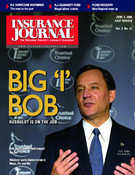Singer Bob Dylan’s song, “The Times, They Are a Changin,'” was cited as a cautionary reminder by Steve Klingel, NCCI Holdings Inc.’s president and CEO, as he gave a positive report on 2005 results for the workers’ compensation industry during the National Council on Compensation Insurance’s May 11-12 Annual Issues Symposium in Orlando, Fla.
“Although Dylan didn’t have workers’ compensation or the property and casualty market in mind, it’s a perfect mantra for our cyclical business,” Klingel said.
“Each year, I have a word to describe my perspective on the workers’ compensation industry for the coming year,” Klingel said. He said in 2003, the word was optimistic. In 2004 it was cautious, 2005 it was flux, and for 2006, it is guarded.
While recent statistics have been positive, Klingel says the system will find itself out of balance, and may soon revisit results similar to the 1990s.
Klingel explained that traditional issues in virtually every state, such as skyrocketing medical costs, legislative reform initiatives, residual market issues, carrier insolvencies federal intervention continue to be challenges for the market. However, Klingel added that while such familiar issues can be critically important in the moment, he said non-traditional forces at work have the potential to fundamentally change workers’ compensation insurance.
He put terrorism at the top of the list as something completely unpredictable with the potential to impact everyone in a myriad of ways on personal, business and societal perspective.
Second on his list was a looming medical crisis that could lead to new forms of health care service delivery, including government or private programs.
“Since workers’ compensation represents only 2 to 3 percent of the overall medical pie, we could easily be swept along in any reform effort,” Klingel said. “Previous efforts have included proposals for 24-hour coverage, and today, our national leaders are considering new directions and any number of traditional to political systems, from the recently initiated Medicare changes to private health savings accounts.”
Klingel said the growth in medical and drug costs continues to be one of NCCI’s top concerns for the market and the organization has been making every effort to accurately track and report on new developments. He said it may be necessary to track even more data on medical costs in order to provide the best possible information.
Third, financial markets are becoming even more global in nature, are highly technology enabled and can instantly react to economic, political and natural forces. He said distinctions are fading between insurance lines, reinsurance and other forms of financial risk management.
“Today, banks sell insurance, insurance companies sell investment services and retirement counseling, even Wal-Mart has applied to get into the financial services sector with its own banks,” Klingel said. “What’s next?”
The ongoing effect of Sarbanes-Oxley was the final item on Klingel’s list of non-traditional concerns.
“Because of this act and because of the desire to create greater competition, regulators at state and federal levels have heightened their scrutiny of our industry,” Klingel said. “Every transaction, process and financial exchange is more transparent. Over the long term this could be a positive development for all stakeholders. Over the short term, there will be an increased need for clear communication on the best ways to improve regulation while maintaining business goals and opportunities.”
Klingel pointed out that workers’ comp is not a form of social insurance and it is not untouchable. “It is entirely possible, maybe even likely that the system of 2020 will only faintly resemble the system of 2006,” he said.
Klingel said tort reform also appears to be gaining acceptance at state and federal levels. He pointed to Mississippi, North Carolina and Missouri as examples of states where tort reform measures to reduce malpractice suits and restrict benefits for workers injured while under the influence of drugs or alcohol were passed. He also said this spring Florida became the ninth state in the nation to completely ban joint and several liability.
Topics Workers' Compensation
Was this article valuable?
Here are more articles you may enjoy.


 Florida Senate President Says No Major Insurance Changes This Year
Florida Senate President Says No Major Insurance Changes This Year  Allstate CEO Wilson Takes on Affordability Issue During Earnings Call
Allstate CEO Wilson Takes on Affordability Issue During Earnings Call  Chubb Posts Record Q4 and Full Year P/C Underwriting Income, Combined Ratio
Chubb Posts Record Q4 and Full Year P/C Underwriting Income, Combined Ratio  Q4 Global Commercial Insurance Rates Drop 4%, in 6th Quarterly Decline: Marsh
Q4 Global Commercial Insurance Rates Drop 4%, in 6th Quarterly Decline: Marsh 


